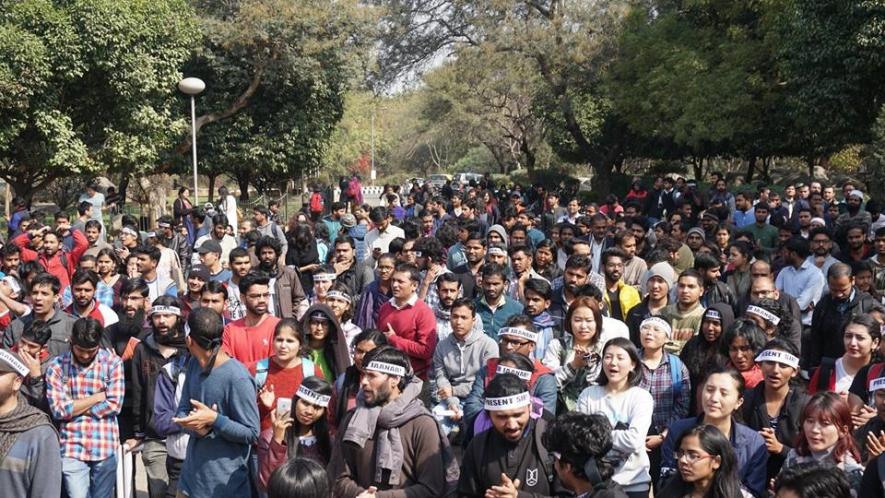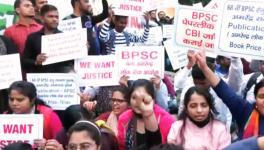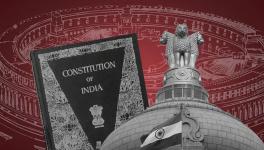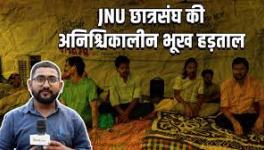Compulsory Attendance: HC Instructs JNU to Not Take “Coercive Steps” Against Students

On July 16, the Delhi High Court directed Jawaharlal Nehru University (JNU) and the lawyers representing it, that “No coercive steps be taken against the students, in pursuance to the attendance requirements, now introduced on behalf of the Jawaharlal Nehru University (JNU), during the pendency of the writ petition.”
This comes as a major relief to all the students of JNU since the fulfilment of a minimum attendance of 75% had been made compulsory for all regular students to continue receiving the following benefits:
- For them to attain/continue with “all fellowships/scholarships (including MCM and Non-Net)”;
- For their “fellowship/Scholarship form(s) … [to] be processed”;
- For them to “be eligible to appear in end-semester examinations”;
- For them to “be eligible to register in the next semester”; and
- For them to avail “any University facilities such as hostel, medical, etc.”
These moves are surely a part of the coercive University Administration regime that has been functioning ever since the Central Government appointed its stooge, M. Jagadesh Kumar as the Vice-Chancellor of JNU.
Also Read: 98 Percent JNU Students Vote Against Mandatory Attendance
The petition being heard in the High Court was filed by JNU professor Kavita Singh along with four other department heads (amongst the seven department heads and one coordinator), who were removed by the JNU Administration (on March 14) for not complying with the ‘mandatory attendance’ circular issued in January this year. The petitioners had challenged their removal in the High Court which instructed the University authorities to reinstate them in a hearing on April 27, 2018.
Monday’s hearing witnessed a heated exchange between Mr. Kapil Sibal, representing the petitioners, and Mr. Aman Lekhi, representing the University. As reported by Bar & Bench, when Justice Mridul suggested that the University had itself stated that it won’t take any coercive steps against the students, Lekhi responded that these students are an “embarrassment to the nation, they are anti-national; they want to break up the country and celebrate Afzal Guru”.
One would be inclined to think that Mr. Lekhi was appearing in a ‘Prime Time Debate’ being ‘moderated’ by the likes of Arnab Goswami, Sudhir Chaudhary or Rahul Shivshankar and not as a lawyer representing one of the best Public Universities in the Country in a court of law.
The decision to implement a minimum of 75% attendance for all regular students, including MPhil and PhD students, was taken in the 144thAcademic Council (AC) Meeting held on December 1, 2017. However, the Jawaharlal Nehru University Teachers’ Association (JNUTA), in a letter to the Committee on Compulsory Attendance dated December 28 had said that “There was no decision by the 144th Academic Council… to make attendance compulsory for all regular registered students.” It goes on to mention that several teachers, members of the AC and otherwise, had expressed dissent against the autocratic and opaque manner in which the decision regarding compulsory attendance had been taken.
Also Read: Hazir Janaab: JNU Students in Full Attendance to Protest VC’s Latest Anti-Student Move
A majority of the teachers and students are of the view that the motive behind this diktat is none other than that which has been pursued ever since February 2016: “the defamation of Jawaharlal Nehru University and its student and teacher communities.”
“The overwhelming opinion amongst teachers of the university is that the diktat for compulsory attendance seeks to manufacture a problem where none exists. There is no pernicious tendency towards absenteeism in JNU students at any level,” the letter stated. The Jawaharlal Nehru University Students’ Union (JNUSU) had held a referendum on the issue earlier this year, and 98% votes were against the compulsory attendance rule.
Although this order will provide a much needed respite to the students and teachers who have been relentlessly protesting for a more inclusive, democratic and free University, a Press Note released on July 13, 2018 has announced two highly regressive decisions which will be detrimental to the functioning of the University, the future careers of students and teachers, and its overall academic excellence. These are:
“Mandatory attendance for the teaching community”, and “To make JNU Entrance Examinations completely computer-based using an online mode.”
The High Court order states that “the petitioners would continue to take regular attendance of the students, in terms of the directions contained in the order dated April 27, 2018, till further orders.” The next hearing will take place on 29 October, 2018.
Get the latest reports & analysis with people's perspective on Protests, movements & deep analytical videos, discussions of the current affairs in your Telegram app. Subscribe to NewsClick's Telegram channel & get Real-Time updates on stories, as they get published on our website.
























